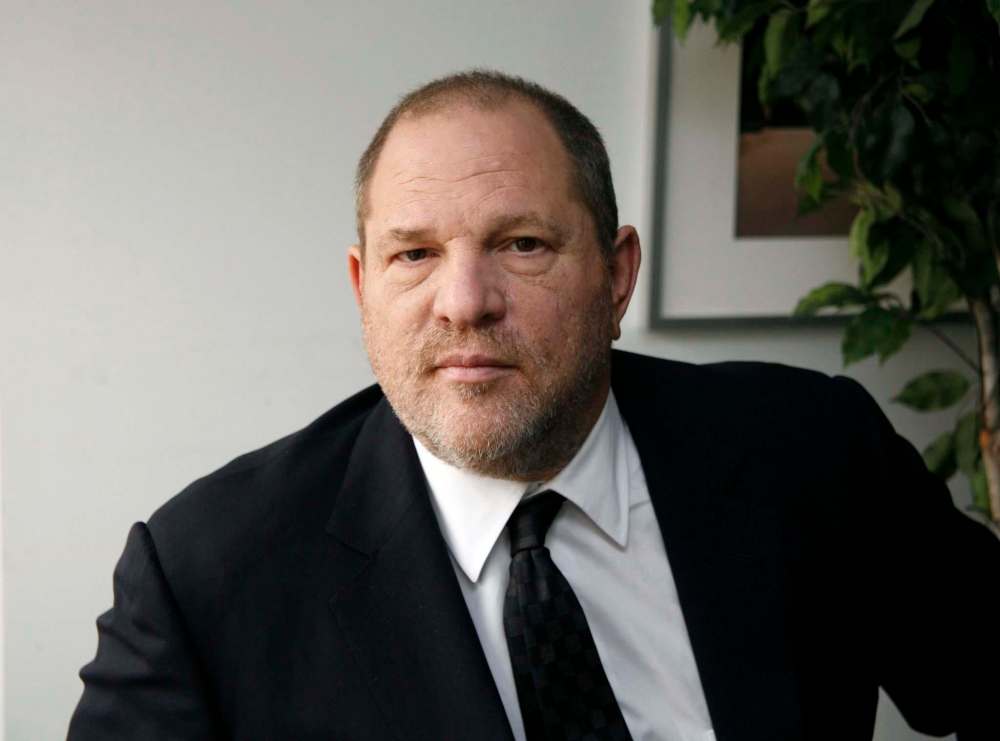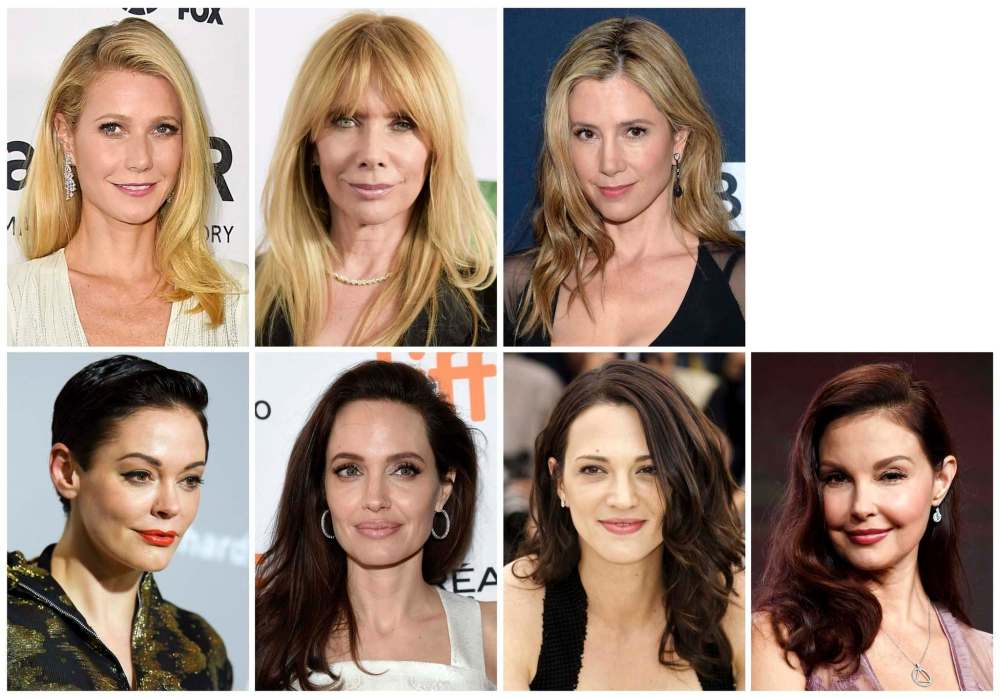Weinstein scandal shows we need better way to deal with perpetrators
Advertisement
Read this article for free:
or
Already have an account? Log in here »
To continue reading, please subscribe:
Monthly Digital Subscription
$1 per week for 24 weeks*
- Enjoy unlimited reading on winnipegfreepress.com
- Read the E-Edition, our digital replica newspaper
- Access News Break, our award-winning app
- Play interactive puzzles
*Billed as $4 plus GST every four weeks. Offer only available to new and qualified returning subscribers. Cancel any time.
Read unlimited articles for free today:
or
Already have an account? Log in here »
Hey there, time traveller!
This article was published 13/10/2017 (2698 days ago), so information in it may no longer be current.
Late at night, when bedroom shadows darken and creep up the wall, when silence seems to hiss and whisper all the secrets that it holds, the mind finds its fears. Imagined threats gnaw at the edges of the known.
None of this is real, we know. There are no monsters in the closet, our parents told us while opening the door to show a pile of unmoving clothes. There are no monsters outside the window, none lurking under the bed.
What goes unspoken: many real monsters are out there, in the open. They are centres of attention. They collect awards. They breeze through ballrooms and hotel bars, a gravitational pull like stars, celebrated and indulged.
You wouldn’t ever tell a child that, though. It would terrify them.
● ● ●
There’s a sort of fatigue some writers are feeling on the topic of sexual harassment and sexual assault. I feel it, often. Other women who have written extensively about the problem have confessed to me that they experience the same exhaustion.
It’s not that we care any less about the topic. It’s that the chorus of this dreary song has become far too familiar. When the first allegation surfaces, it’s not hard to predict — with exasperating accuracy — how the ensuing days will unfold.
What else is there left to say when all else has been said a thousand times? What else is there to know?
And I’m tired, so tired of this pattern, so tired of bumping down these rutted and filth-strewn roads. Still, it’s happening again, and again it demands a response. So I’ll roll up these threadbare writing sleeves and get back to work. So…
● ● ●
This is how it went, when Hollywood mogul Harvey Weinstein’s abuses were — by all accounts, at long last — dragged into the light this week. There was nothing surprising in how it happened; it went the same way it nearly always goes.
First, there came the allegations, supported by reams of reporting: for decades, Weinstein used his power and position to harass, assault and abuse young women. His ability to destroy careers intimidated many into silence.
“Don’t ruin your friendship with me for five minutes,” Weinstein warned actress Ambra Battilana Gutierrez, in an exchange caught on tape during a police sting in 2015. The night before, she told police, he had groped her.
By the middle of the week, at least 20 women had come forward, including Gwyneth Paltrow, Angelina Jolie and Mira Sorvino. For years, some of them said, they’d tried to warn other women in the business to stay away from Weinstein.

This network of whispers is how people try to protect each other when all other routes are dangerous or closed.
Next, there came the observers. Actors and executives stepped forward to confirm that Weinstein’s harassment was so widely known in Hollywood, it can barely be termed an open secret; any veil of secrecy was thin and full of holes.
At the 2013 Oscars, host Seth MacFarlane joked that the Best Supporting Actress nominees would no longer have to “pretend to be attracted to Harvey Weinstein.” This week, he acknowledged he knew about Weinstein’s abuses.
Right on cue, next came the apologists, though it seemed as if there were fewer than in cases past. Lindsay Lohan posted a video saying she feels “very bad for him” and urged Weinstein’s wife to “take a stand” for her husband.
Choosing to ignore Lohan’s advice, Georgina Chapman announced she was seeking divorce. “My heart breaks for all the women who have suffered tremendous pain because of these unforgivable actions,” she said in a statement.
Then, at last, there comes the weighing of sins. The disgraced and their misdeeds are placed on the scales of status quo, to be weighed against the investment made in them — the power they wield, the sheer capital they command.
If the perpetrator sinks, they may be jettisoned. If they stay aloft, they may become president of the United States.
The scales tipped in Weinstein’s favour for a long, long time.
● ● ●
A friend once recounted a story for me about a ceremony she had witnessed. It was at a multi-day gathering on Indigenous territory. One night, a young man groped a young woman; she pushed him off and ran to tell adults.
The next morning, the young man’s family approached the victim. They offered apologies and denounced the young man’s behaviour. They presented the young woman with gifts, to validate her hurt and make material their amends.
Then they left the event, dragging the young man with them. The young woman stayed and was supported.
This process works only if there is equity between parties. It works only if the perpetrator is not held as more valuable than the safety of the community around them, and if everyone is considered to be accountable to and for each other.
For years, I have been transfixed by restorative justice. Evidence and common sense have shown me it works as a way to uphold and reinforce healthy community norms; that it can hold a key place in justice other mechanisms cannot.
Because the lesson of Weinstein’s exposure isn’t that he is a unique type of monster; we know from the very familiarity of the pattern that he is not. Nor is it that Hollywood is uniquely infected by sexual predation.
To be sure, the entertainment industry has a major problem. In July, the Guardian ran a piece on the pernicious violence of “casting couch” culture and how famous producers and directors prey on young actors’ vulnerability.
Yet many other sectors wrestle with the same abusive patterns. Earlier this year, the RCMP made a landmark settlement for decades of sexual harassment claims. Lawyers estimate there will be as many as 1,000 claimants.
But Weinstein’s case is notable precisely because it is not unusual, not unique. It is, in fact expected.
That is because, to put it simply, we learn time and time again that there’s no good response to sexualized abuse of power in Canada or the United States. No coherent mechanism for confronting perpetrators where they lurk.
We have many structures of self-protection. But these all have different requirements, different aims. The justice system has a vital place, but it is adversarial with tight evidentiary requirements; it also moves at a snail’s pace.
Media has an important role to play in calling powerful abusers to account. But it is also not a first-line defence. Reporters are constrained not just by what they know, but what they can prove. Usually, it needs a dam to break.
In the notebooks of journalists around the world, trust that there are jotted notes about powerful people who exploit the people around them. Some of those stories will come out, eventually — we will do this again — others never will.
What neither the media nor the justice system can do is provide dynamic, real-time responses to abuse that hinges on manipulation and real fear of reprisals. They are not well-equipped to provide on-the-ground protection from power.
Instead, we turn to structures designed not to protect communities and people, but to protect businesses and capital.
The New York Times reported the Weinstein Company board has known about payouts to past victims since at least 2015. Sixteen current and former executives told the New Yorker they knew about Weinstein’s behaviour.
Given how apparently widespread knowledge of his abuses was within the company and the industry, it’s certainly reasonable to question whether people with the power to stop Weinstein knew for much longer than two years.
They did nothing. In 2015, aware of at least some allegations, the board approved Weinstein’s latest contract. The scales tipped in his favour then; they did right up until this week, when his sins finally outweighed his own power.
So the lesson here, again, is that what is lacking — what we need — is some kind of coherent, community-based response to powerful abusers. Some kind of option to challenge harms and transgressions even as they happen.
Imagine if, over all these years, Weinstein’s victims could have come forward without risking their careers? What would have happened if the community had been able to call Weinstein to account, drag him out and force him to make amends?
Maybe we would not be here again. Missing the days when the only monsters we worried about were hiding under beds.
melissa.martin@freepress.mb.ca


Melissa Martin
Reporter-at-large
Melissa Martin reports and opines for the Winnipeg Free Press.
Our newsroom depends on a growing audience of readers to power our journalism. If you are not a paid reader, please consider becoming a subscriber.
Our newsroom depends on its audience of readers to power our journalism. Thank you for your support.

